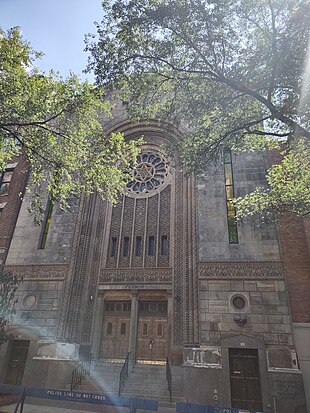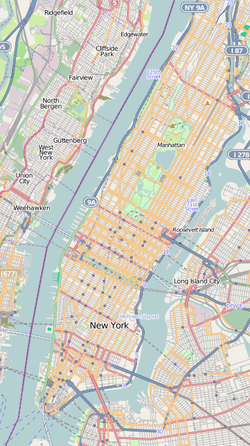| Congregation Ohab Zedek | |
|---|---|
 | |
| Religion | |
| Affiliation | Modern Orthodox Judaism |
| Ecclesiastical or organizational status | Synagogue |
| Leadership |
|
| Status | Active |
| Location | |
| Location | 118 West 95th Street, Upper West Side, in Manhattan, New York City, New York 10025 |
| Country | United States |
Location in Manhattan | |
| Geographic coordinates | 40°47′33″N 73°58′8″W / 40.79250°N 73.96889°W |
| Architecture | |
| Architect(s) |
|
| Type | Synagogue |
| Style | Moorish Revival |
| Date established | 1873 (as a congregation) |
| Completed |
|
| Website | |
| ozny | |
Congregation Ohab Zedek | |
| NRHP reference No. | 100001487 |
| Added to NRHP | August 18, 2017 |
Congregation Ohab Zedek, sometimes abbreviated as OZ and formally known as the First Hungarian Congregation Ohab Zedek, is a Modern Orthodox Jewish congregation and synagogue located at 118 West 95th Street, Upper West Side, in Manhattan, New York City, New York, United States. The congregation is known for its lively, youthful congregation.[1] Founded in 1873, it moved to its current location in 1926. The current clergy are Rabbi Allen Schwartz, Senior Rabbi and Rabbi Jack Varon, assistant Rabbi. The Executive Director is Chad Hopkovitz.
History
[edit]Lower East Side
[edit]Congregation Ohab Zedek was founded in 1873 on the Lower East Side. The congregation built a synagogue building at 70 Columbia Street in 1881. In 1886 the congregation sold the Columbia Street building to Congregation Ahavath Acheim Anshe Ungarn and moved into the Gothic Revival-style synagogue at 172 Norfolk Street that is now the Angel Orensanz Center, the oldest surviving synagogue building in New York and the fourth-oldest in the United States.[2] Rabbi Philip Klein served as its rabbi from 1890 to his death in 1926.[3]
116th Street building
[edit]In 1906–07 the congregation built and moved into a "monumental" building on 116th Street, in the newly fashionable neighborhood of Harlem. The "monumental" design was influenced by the Gothic character of the previous Norfolk Street home. The street-facing gable prominently featured a large four-centered arch-headed window over a large pedimented doorcase, appearing styled in loose or Vernacular Gothic on the interface of Moorish Revival architecture.
The famous singer Yossele Rosenblatt was a cantor there from 1911 to 1926, and again in 1929.[4]
In 1926 OZ moved to its present building at 118 West 95th Street; the 116th Street property was sold, eventually becoming the Baptist Temple Church, which occupied the location for over five decades. Conversion into a church removed the Jewish-themed terracotta ornaments. Costly structural damage necessitated the building's demolition, which occurred slowly throughout late 2009 and early 2010.
West 95th Street
[edit]The current synagogue building at 118 West 95th Street (constructed in 1926) is noted for its Moorish Revival architecture. Designed by architect Charles B. Myers, the interior features magnificent Mudéjar style plasterwork. The building was listed on the National Register of Historic Places on August 18, 2017.[5]
Early in the 21st century, the congregation became known for attracting large numbers of Orthodox Jewish singles to its services and programs.[1] The congregation published a book in 2005 about its history, First Hungarian Congregation Ohab Zedek, written by Chaim Steinberger, a member of the congregation.
References
[edit]- ^ a b Bleyer, Jennifer (August 10, 2008). "Marriage on Their Minds". The New York Times.
- ^ Dunlap, David W. (February 18, 1987). "New Life Is Envisioned For Historic Synagogue". The New York Times. Retrieved October 11, 2011.
- ^ Landman, Isaac, ed. (1942). The Universal Jewish Encyclopedia. Vol. 6. New York, N.Y.: The Universal Jewish Encyclopedia, Inc. p. 415 – via Google Books.
- ^ Olivestone, David. "Yossele Rosenblatt (II), The remarkable career of Cantor Rosenblatt". Chazzanut.com. Retrieved October 11, 2011.
- ^ "Congregation Ohab Zedek". National Register of Historic Places. August 18, 2017. Retrieved December 6, 2023.
